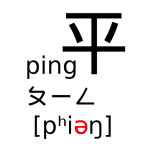Articles in the ‘Speaking’ category Page 8
-
Learning to pronounce Mandarin with Pinyin, Zhuyin and IPA: Part 2
Which transcription system should you use for Mandarin Chinese: Pinyin, Zhuyin or perhaps IPA? Which system you start out with isn’t extremely important, but if you care about pronunciation, it certainly helps to learn more than one system. In this article, I discuss the pros and cons of all three systems and offer some advice about learning pronunciation.
Read → -
Learning to pronounce Mandarin with Pinyin, Zhuyin and IPA: Part 1
Learning to pronounce Mandarin involves several steps. You need to first discriminate between and then identify the sounds, but you also need to be able to write them down and also be able to read how words are pronounced. In this article, I discuss this process and how you should go about it. It also contains advice for what to avoid!
Read → -
Why you should learn Chinese in Chinese
It’s helpful to use your native language to learn Chinese, but one of the first things you should do is to convert anything you use often in the learning process into Chinese. This includes common classroom expressions or other phrases used when learning. Advanced students will find challenges in Chinese-only learning materials and dictionaries.
Read → -
Will a Chinese-only rule improve your learning?
Is a Chinese-only rule good for learning? Most people agree that immersion is a good thing, but that’s not the same as saying that using no English is good
Read → -
24 great resources for improving your Mandarin pronunciation
In this article, I list 24 great resources for learning pronunciation. Naturally, some of them are limited to Mandarin Chinese, but many are more general in nature and works for other Chinese dialects or even other languages. Resources are sorted into Basic sound references, Pronunciation explained, Advice on learning pronunciation and Useful software and applications.
Read → -
Focus on initials and finals, not Pinyin spelling
Instead of worrying too much about Pinyin spelling and what sounds each letter represents, students of Mandarin should zoom out a bit and focus on initials and finals as whole units. There are only around 60 of them and focusing on them will pay off handsomely.
Read → -
How knowing your best performance in Chinese can help you improve
When learning Chinese, it’s important to know how good your best performance is, because this determines the way you study. If your best performance is good enough, you mostly need high-volume practice, more of the same will get you there. But if your best performance isn’t good enough, you need to change tactics and go for high-quality practice instead.
Read → -
Learning how to ask for and receive directions in Chinese
Asking for and receiving directions in Chinese might look very easy, it’s usually in the first part of a textbook series after all, but most students go through that chapter without actually learning the content. In this article, I discuss how to really learn this skill.
Read → -
Improve your pronunciation with the Hacking Chinese pronunciation check
I’ve found that pronunciation is one of the most neglected areas in Chinese language teaching. Teachers don’t have the time or don’t know how to teach it properly. This means that students are left with bad pronunciation, often without knowing it. The goal with this course, which is now open for limited testing, tries to address this.
Read → -
Language learning with a Chinese girlfriend or boyfriend
Learning Chinese with a partner is very good, because it makes you more motivated and makes it more fun to learn. However, it isn’t a magic bullet that will solve all your problems. You will still need to study, you will still need to practice, it’s just that some of the things you need to learn will be more enjoyable and you will hopefully be more motivated to learn. That’s worth a lot, but you can find other fun ways to learn and other things to drive you forwards.
Read →








